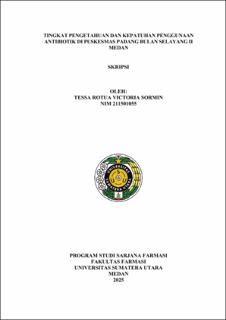| dc.description.abstract | Background: The global prevalence of antibiotic use increased by 65% between 2000 and 2015 across 76 countries, with an average increase of 39% in defined daily doses per 1,000 patient-days. Knowledge and adherence to antibiotic use are critical factors in reducing antibiotic resistance
Objective: This study aims to assess the levels of knowledge and adherence to antibiotic use, the differences in respondent characteristics related to knowledge and adherence, and the relationship between knowledge level and adherence to antibiotic use at Puskesmas Padang Bulan Selayang II in Medan.
Methods: A descriptive study with a cross-sectional approach was conducted using a questionnaire to evaluate knowledge and adherence to antibiotic use. The study was carried out from February to April 2025 at Padang Bulan Selayang II Public Health Center in Medan. The statistical tests used were Mann-Whitney and Kruskal-Wallis, analyzed with the Statistical Package for the Social Sciences version 22
Results: The study involved 366 respondents (response rate 95.06%), with 39.3% having a high level of knowledge, 58.2% moderate, and 2.5% low. Regarding adherence to antibiotic use, 15,02% showed high adherence, 67,2% moderate, and 17,7% low. Spearman's rho test showed a significant and strong correlation between knowledge level and adherence to antibiotic use (r = 0.701).
Conclusion: The majority of respondents had a moderate level of knowledge about antibiotic use, while most showed low adherence. There were significant differences in patient characteristics (education and occupation) in relation to both knowledge and adherence to antibiotic use. | en_US |


